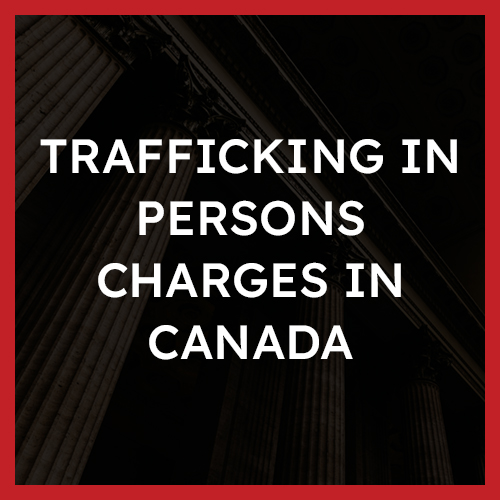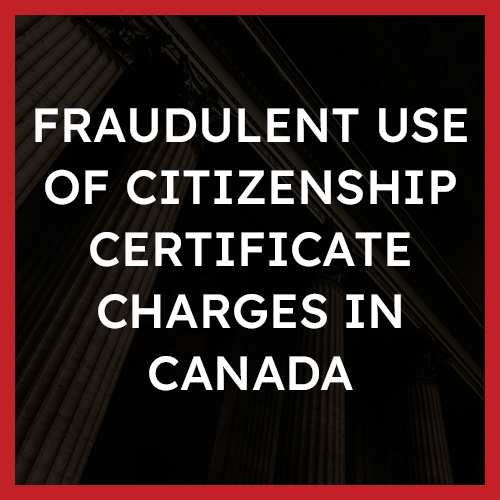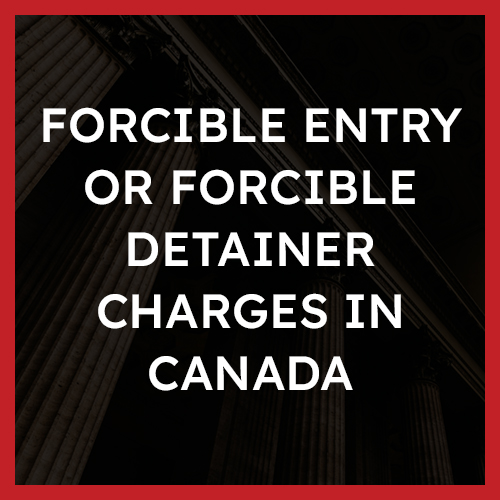Trafficking In Persons (s. 279.01-04) Charges in Canada: Offences, Defences, Punishments
What is a Trafficking in Persons charge?
 Trafficking in persons is covered under 279.01-04 of the Criminal Code Part VII of the Criminal Code relating to “Offences Against the Person and Reputation.”
Trafficking in persons is covered under 279.01-04 of the Criminal Code Part VII of the Criminal Code relating to “Offences Against the Person and Reputation.”
A trafficking in persons charge applies when someone recruits, transports, transfers, holds, conceals, or harbours another person against their consent or influences their movements for the purpose of exploiting them or aiding in their exploitation.
Offences under s. 279.01 [trafficking in persons – general], 279.011 [trafficking in persons, under 18 – general], 279.02, and 279.03 are straight indictable offences. There is a Defence election of Court under s. 536(2) of the Criminal Code and one offence under the Immigration and Refugee Protection Act (IRPA) explicitly addressing the trafficking of other people.
Examples of Trafficking in Persons
A trafficking in persons or trafficking in humans charge can arise from many different types of situations.
Examples of situations in which a trafficking in persons charge may apply include the following:
- Trafficking in persons
- Trafficking of a person under the age of 18
- Receiving a financial or other material benefit for the purpose of committing or facilitating trafficking in persons (this includes pimping);
- Withholding or destroying a person’s identity documents to commit or facilitate the trafficking of that person (adult victim or child victim)
- Knowingly organizing someone coming into Canada by means of abduction, fraud, deception, or use or threat of force or coercion
Defences
Trafficking in persons charge may have several appliable defences, depending on the specific details of the case.
However, some possible defences to a trafficking in persons charge may include the following:
- The accused was wrongly identified as the person who was trafficking persons
- The accused didn’t recruit, transport, transfer, receive, hold, conceal, or harbour someone or exercise control, direction, or influence over the movement of the person
- Their influence or control was not for the purpose of exploiting the victim
Punishments
A trafficking in persons charge is a straight indictable offence.
The potential punishment for human trafficking convictions will vary widely depending on the specific details in the charge and whether the accused charge involves:
- Secondary offences
- Someone under the age of 18
Human trafficking offences can only be prosecuted by indictment. The minimum sentence for indictment is five years incarceration (under 18) or six years incarceration (under 18 with harm). The maximum sentences are five, ten, or 14 years. On the high end, Trafficking in a Person Under 18 (Accompanied by a Secondary Offence) has a maximum sentence of life.
However, some lower-end offences, such as Withholding or Destroying Documents for Trafficking, is a hybrid offence and, therefore, can be prosecuted by either summary election or indictment.
Overview of the Offence
Section of the Criminal Code s.279.01-04:
Trafficking in Persons
279.01 (1) Every person who recruits, transports, transfers, receives, holds, conceals, or harbours a person or exercises control, direction, or influence over the movements of a person, for the purpose of exploiting them or facilitating their exploitation is guilty of an indictable offence and liable:
- To imprisonment for life and to a minimum punishment of imprisonment for a term of five years if they kidnap, commit an aggravated assault or aggravated sexual assault against, or cause death to, the victim during the commission of the offence; or
- To imprisonment for a term of not more than 14 years and to a minimum punishment of imprisonment for a term of four years in any other case.
(2) No consent to the activity that forms the subject-matter of a charge under subsection (1) is valid.
The Guilty Act (Actus Reus)
To establish actus reus, the unlawful act must be voluntarily committed. Therefore, the accused must have had criminal intent.
The actus reus for a trafficking in persons under charge under s. 279 (1) is established by proof, beyond a reasonable doubt, of the following facts:
- The accused either recruited, transported, transferred, held, concealed, or harboured someone or exercises control, direction, or influence over their movements
- The accused committed the act “for the purpose of exploiting them or facilitating their exploitation”
- They caused the victim to provide or offer to provide a labour or service
- The victim could reasonably be expected to believe that their safety or the safety of a person known to them would be threatened if they failed to provide, or offer to provide, the labour or service
Other charges require additional facts to be proven.
For example, to prove aggravated trafficking in young persons under s. 279.011(1)(a), the Crown would need to prove the following:
- The underlying elements of s. 279.01
- That the victim was under the age of 18 when the accused committed the offense
- The accused knew, was reckless or willfully blind to that fact
- The accused either kidnaps the victim, commits an aggravated assault or aggravated sexual assault against the victim, or causes the victim’s death
- The act occurs during the commission of the trafficking offence
The Guilty Mind (Mens Rea)
Canadian law also requires a subjective mens rea or an intent, knowledge, recklessness, or willful blindness to prove the case— unless Parliament clearly indicates otherwise. The accused must have participated in the harmful action.
The mens rea for a trafficking in persons charge under s. 279(1) includes proving, beyond a reasonable doubt, that:
- The accused had a general intent to recruit, transport, transfer, hold, conceal, or harbour another person or to exercise control, direction, or influence over their movements
- The accused committed the act “for the purpose of exploiting them or facilitating their exploitation”
- The accused caused the victim to provide or offer to provide labour or service
If the Crown cannot prove these things, the accused can’t be convicted of this crime.
Defences
Successfully Beating a Trafficking in Persons Charge
To successfully beat a trafficking in persons charge, a defence must be used according to the specific facts of your case. All defences won’t work in all cases. Therefore, choosing the best applicable defence is crucial according to the details of your case. Some of the most frequently used defences in a trafficking in persons charge include the following:
Factual Innocence
A factual innocence defence can be used in some trafficking in persons charges. Under a factual innocence defence, you argue that you are indeed innocent based on the facts of the case alone. When using this defence, you must establish the essential facts with evidence showing that your actions don’t fit the requirements of the charges for trafficking in persons. For example, you can do this by proving the following:
- You didn’t recruit, transport, transfer, hold, conceal, or harbour another person or to exercise control, direction, or influence over their movements
- You didn’t commit the act “for the purpose of exploiting them or facilitating their exploitation”
- You didn’t cause the victim to provide or offer to provide a labour or service
Identity
Courts must only convict someone of a crime if they are certain it was committed by them. With the identity defence, you maintain that you were wrongfully identified as the person who was committing offences under the trafficking in persons law. When using this defence, the accused must show that they shouldn’t have been the individual charged because it was someone else who committed the acts to be charged with the trafficking in persons crime.
Duress
Duress defence may be relied on if someone commits an offence under threats of bodily harm or death. To be eligible to use this defence, the threat, and crime must have a close time connection, and the accused must have no safe way to escape.
Violation of Charter Rights
Per the Canadian Charter of Rights and Freedoms, individuals in Canada have specific rights, including the right:
- Against unreasonable search and seizure
- To not be arbitrarily detained
- To be informed promptly of the reasons for arrest
- To retain and instruct counsel without delay
- To be tried within a reasonable time
A successful Charter challenge could also cause a stay of proceedings or evidence from your case being excluded from your court case.
Punishments
A trafficking in persons charge is only an indictable offence. It is not a hybrid or eligible as a summary offence. However, some lower-end offences, such as Withholding or Destroying Documents for Trafficking, are a hybrid offence and, therefore, can be prosecuted by either summary election or indictment. If prosecuted summarily, per s. 787 (1) of the Criminal Code, the maximum punishment is two years less a day imprisonment and/or a fine of up to $5,000. If prosecuted by indictment, the maximum penalty is five years imprisonment.
However, other human trafficking offences can only be prosecuted by indictment. The minimum sentence for indictment is five years incarceration (under 18) or six years incarceration (under 18 with harm). The maximum sentences depend on the specific charges and can be five, ten, or 14 years. On the high end, Trafficking in a Person Under 18 (Accompanied by a Secondary Offence) has a maximum sentence of life.
A trafficking in persons conviction is a serious criminal offence in Canada. Therefore, it could have additional natural consequences outside the court system, including issues with gaining employment or immigration status.
Frequently Asked Questions
Is human trafficking an indictable Offence?
Human trafficking falls under the umbrella of trafficking in persons law in Canada. Since all trafficking in persons charges are indictable offenses, human trafficking is also an indictable offence. Depending on the specific circumstances of the charges, the accused may face a maximum of ten years to life in prison. However, other related offences are sometimes punishable summarily and receive lesser punishments of up to less than two years in prison and a $5,000 fine.
What is the difference between human trafficking and trafficking in person?
By general definition, there is no difference between human trafficking and trafficking in person. Trafficking in persons’ and ‘human trafficking’ are interchangeable terms. The United Nations began using the term ‘trafficking in persons’ when it passed the Protocol against Trafficking in Persons. Canada uses the same term in their criminal code to describe human trafficking activities. Any human trafficking is illegal in Canada under the trafficking in persons law.
What is the Criminal Code for trafficking in persons in Canada?
The Criminal Code for trafficking in persons in Canada is s.279(1) and is as follows:
“279 (1) Every person commits an offence who kidnaps a person with intent
- to cause the person to be confined or imprisoned against the person’s will;
- to cause the person to be unlawfully sent or transported out of Canada against the person’s will; or
- to hold the person for ransom or to service against the person’s will.
Punishment
(1.1) Every person who commits an offence under subsection (1) is guilty of an indictable offence and liable
- if a restricted firearm or prohibited firearm is used in the commission of the offence or if any firearm is used in the commission of the offence and the offence is committed for the benefit of, at the direction of, or in association with, a criminal organization, to imprisonment for life and to a minimum punishment of imprisonment for a term of
- in the case of a first offence, five years, and
(ii) in the case of a second or subsequent offence, seven years;
(a.1) in any other case where a firearm is used in the commission of the offence, to imprisonment for life and to a minimum punishment of imprisonment for a term of four years;
(a.2) if the person referred to in paragraph (1)(a), (b) or (c) is under 16 years of age, to imprisonment for life and, unless the person who commits the offence is a parent, guardian or person having the lawful care or charge of the person referred to in that paragraph, to a minimum punishment of imprisonment for a term of five years; and
(b) in any other case, to imprisonment for life.”
Published Decisions
R v Chahinian, 2022 QCCA 499 (CanLII)
The appellant was previously found guilty of:
- Human trafficking
- Having benefited from a material advantage resulting from human trafficking
- Having knowingly advertised to provide sexual services for consideration
The trial judge pronounced a stay of proceedings on the offences, which accused him of having led a person to offer or render sexual services for consideration and of having benefited from a pecuniary advantage resulting from the provision of sexual services.
The appellant sought leave to appeal a total sentence of four years imprisonment accompanied by an alternative fine of $10,000. However, the appellate court denied his request, siding with the lower court, and ordered him to report to prison.
You can read the full decision here.
R v Perreault, 1996 CanLII 5641 (QC CA)
The appellate court held that, at trial, the evidence clearly revealed the direction the appellant had over his victims’ movements, within the meaning of section 212(1)(h) Cr.
The appellant:
- Placed advertisements in the newspaper to recruit customers
- Evaluated the tastes of the latter and selected the candidate who, according to his assessment, corresponded to the desires of the client
- Provided young girls with an outfit that he considered appropriate for their functions
- Imposed rules for meetings with clients, including the obligation to demand payment before the services were rendered
- Provided a driver and distributed the money
This set of gestures constitutes, without a doubt, an exercise in direction with young girls. As such, even if the trial judge didn’t qualify them as such in his judgment, they are facts that he observed and which served as the basis for his judgment. Had the judge appreciated the leading element of the prosecution, he would have come to the same conclusion as to guilt.
You can read the full decision here.
R v NG, 2008 BCCA 535
Michael Ng brought two Chinese women into Canada under the pretence that he would employ them as waitresses in his restaurant. Instead, he made them provide sexual services to clients in his massage parlour. Ng initially received a 15-month jail sentence, and the Crown appealed the decision.
While Ng’s acquittal on human trafficking charges under the Immigration and Refugee Protection Act was upheld on evidentiary grounds, the appellate court held that his sentence for prostitution-related convictions under the Code was inadequate. In 2009, the B.C. Court of Appeal raised his sentence by one year to a total of 27 months, recognizing that the original sentence was “unfit.” The court also did this to acknowledge the significance of deterrence and denunciation of these crimes.
You can read the full decision here.
About The Author
Ask A Question
We endeavor to respond to questions within 24 hours. If your matter is urgent, please call our office or submit a request for a free consultation.







